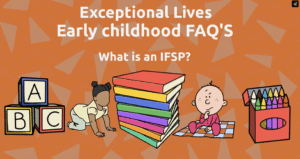Getting a new diagnosis or finding out your child is behind on their milestones may seem like a lot to manage. There are a ton of new terms, acronyms, and systems that you may not be familiar with. In our new Early Childhood series, we’re here to answer some frequently asked questions around having a child between the ages of 0-3 who has disabilities or delays.
Let’s talk about IFSP’s (Individualized Family Service Plan). If your child is enrolled in Early Intervention (this can have a different name depending on where you live – in Louisiana it’s called EarlySteps), one of the first things that happens is your child’s team will develop an IFSP. You may be asking yourself, “What is an IFSP?” If you’ve ever wondered how to best support your child’s development or felt unsure about the services available to them, learning about Early Intervention and IFSPs could be a game-changer for you and your family.
Imagine having a personalized roadmap tailored to your child’s unique needs, designed to help them thrive and reach their full potential before they start school. That’s exactly what an IFSP offers. From addressing physical milestones to nurturing communication skills and beyond, this comprehensive plan empowers parents like you to actively participate in your child’s growth and development. Here’s a short video on what you need to know about having an IFSP.
Learn more:
Exceptional Lives Early Childhood Development Hub
Early Intervention First Steps: Getting your baby or toddler started
What are Early Intervention Services? Can they help my child?
Transcript:
Do you have a child between the ages of zero and three? Great. We’ve got answers to your most commonly asked questions about IFSP’s.
Welcome to the Exceptional Lives Early Childhood FAQ Series. An IFSP is an individualized family service plan that is given when your child qualifies for early intervention.
What does that mean? In short, it’s a document that lays out the supports and services kids with developmental delays need to start catching up before they start school. Some areas that may be covered in an IFSP are child information and contact info, your concerns about your child’s development, where they are now, and approaches and services to help you reach your goals.
The IFSP Team is crucial in the success of your child because it keeps everyone on the same page. Depending on a child’s needs, the IFSP Team may also include specialists like healthcare providers, therapists, child developmental specialists, or a social worker. It also includes you as the parent or caregiver.
If you’d like more information and services, visit our Family Engagement Hub on our website at www.exceptionallives.org.



